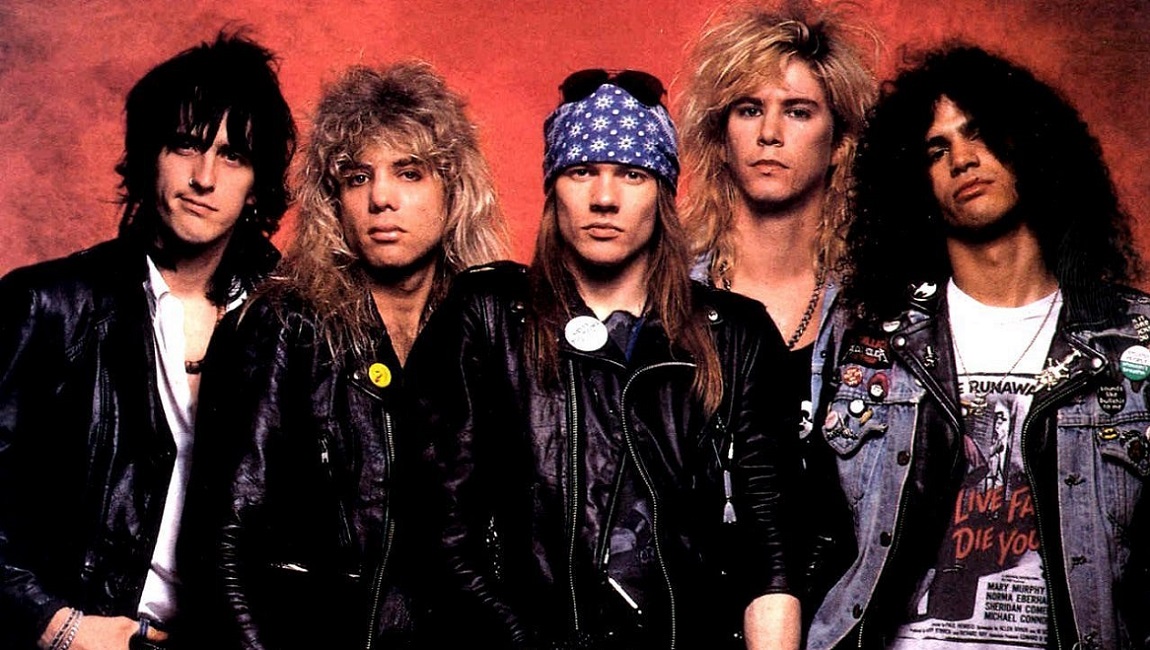“You know where you are? You’re in the jungle, baby! You’re gonna dieeeeahhhh!” Axl Rose’s banshee wail, keening forth from the bridge of “Welcome to the Jungle” — the opening track of Guns N’ Roses’ 1987 debut album Appetite for Destruction — is the climactic moment of the potent opening salvo for a seminal hard rock record, as well as a statement of purpose for the band itself, the most successful to come out of L.A.’s Sunset Strip rock club scene of the ’80s.
Unlike their pop metal peers, in the form of such bands as Mötley Crüe, Poison, Ratt, Skid Row, Warrant, and Cinderella, Guns N’ Roses went easy on the makeup, poofy hair, spandex, and stiletto heels, opting for a grittier, rougher image. Their music also differed from their contemporaries, being more directly influenced by punk and classic rock, including decade icons such as Aerosmith and AC/DC. And their arrangements were considerably funkier than most hard rock acts of the time; the rhythm section of guitarist Izzy Stradlin, bassist Duff McKagan, and drummer Steven Adler was as much influenced by Prince and Cameo as by the Sex Pistols and the Ramones. Add to that the fact that they had one of the greatest guitar players of all time in Slash, who mostly eschewed Eddie Van Halen-type pyrotechnics and instead delivered melodic solos that organically served the songs rather than overly calling attention to themselves.
More traditionally, Guns N’ Roses’ lyrical content delved deeply into the sordid details of the sex, drugs, and debauchery of life on the Strip. The opening lines of “Welcome to the Jungle” state this plainly, with Axl Rose as our gleefully sneering tour guide: “Welcome to the jungle, we got fun and games / We got everything you want, honey, we know the names / We are the people that can find whatever you may need / If you got the money, honey, we got your disease.” Indeed, references to sex and drugs are copious throughout Appetite for Destruction. “Nightrain” is an ode to getting wasted with the titular brand of cheap wine, and probably other substances as well. “Mr. Brownstone” takes the POV of a heroin user deep in the throes of his addiction: “I used to do a little but a little wouldn’t do it / So the little got more and more.” And to that point, Guns N’ Roses had extensive experience with heroin; Slash, Izzy Stradlin, and Steven Adler were active heroin users for most of the band’s peak commercial period.
Elsewhere, the sexual references in Appetite for Destruction, of which there are many, are sometimes employed in baldly misogynistic terms. “It’s So Easy,” the album’s second track and first single, is a jaded account of rock stars’ easy access to groupies’ sexual favors. It also contains the album’s worst lyrical instance of dehumanizing misogyny: “You get nothing for nothing if that’s what you do / Turn around, bitch, I got a use for you / Besides, you ain’t got nothing better to do / And I’m bored.” But perhaps the album’s most infamous track is its closer, “Rocket Queen,” which contains the orgasmic moans of Adriana Smith, a stripper girlfriend of Steven Adler, who after learning he was cheating on her, agreed to be recorded having sex in the studio with Axl Rose, the sounds of which were placed on top of Slash’s atmospheric guitar solo. Smith received no payment or credit for her contribution to the album, just a bottle of Jack Daniels and a subsequent life of drug and alcohol abuse following the public shaming she suffered after this event.
So certainly, there’s plenty of ugliness and squalor on display in Appetite for Destruction, but there’s also some lightness and even a bit of transcendent beauty, courtesy of the album’s two best songs, as well as its biggest singles. “Paradise City” expresses in its verses the narrator’s frustration with the stresses of city life: “Strapped in the chair of the city’s gas chamber / Why I’m here, I can’t quite remember.” However, the chorus goes on to imagine an idyllic escape from the madness: “Take me down to the Paradise City / Where the grass is green and the girls are pretty / Oh, won’t you please take me home.”
But for all that, the group was and has been largely measured by its idiosyncratic lead man, and if you need a textbook example of the duality of human nature, look no further than Axl Rose, who by all accounts was a destructive, out-of-control jerkoff, but was also a supremely talented vocalist and songwriter. These talents are embodied by the album and band’s finest moment, “Sweet Child O’ Mine,” Guns N’ Roses first and only #1 US single. It’s an ode to Rose’s girlfriend at the time, Erin Everly, largely driven by Slash’s iconic calliope-like opening riff and his insanely powerful solo. Rose looks to Erin as an oasis from the world’s troubles: “Her hair reminds me of a warm, safe place / Where as a child I’d hide / And pray for the thunder and the rain to quietly pass me by.” But these thoughts of love don’t completely ease his fear and uncertainty, as indicated by Rose’s anguished cries of “Where do we go now?” which close out the song.
Appetite for Destruction was a commercial slow burn, taking over a year to reach #1 on the Billboard 200 album chart. But it eventually went 18 times platinum in the US, making it the best-selling debut album of all time. And it’s easy to see why this album so thoroughly captured the public imagination. It’s at once a time capsule of a specific era, capturing and pushing forward a certain ’80s sound, and a timeless concoction, boasting hard rock riffs, funky rhythms, and compelling tales of Dionysian excess. Pure, messy rock n’ roll.
Part of Kicking the Canon – The Album Canon.







